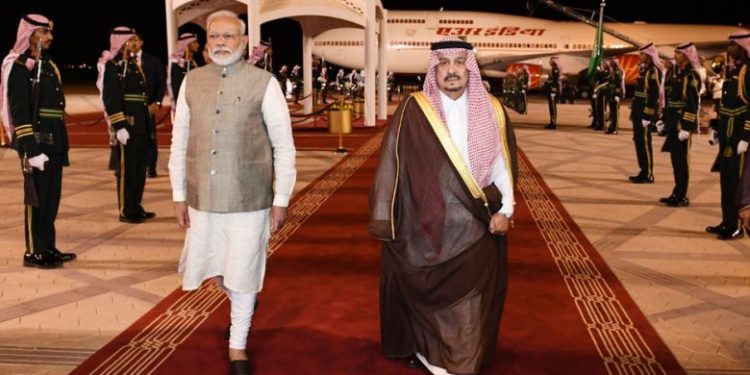Riyadh: The Strategic Partnership Council agreement to be signed between India and Saudi Arabia will strengthen the already robust relations between the two nations, visiting Prime Minister Narendra Modi said here Tuesday.
India will become the fourth country to sign such an agreement with Saudi Arabia. Modi, who reached Riyadh Monday night on a two-day official trip, described the nation as a “valued friend” of India in a tweet earlier. This is his second visit to the Kingdom in three years.
Speaking to Arab News, Modi said the two countries have been working together within the G20 to reduce inequality and promote sustainable development.
Saying stable oil prices were crucial for the growth of the global economy, Modi praised Saudi Arabia’s role as an important and reliable source of India’s energy requirements.
“Since my first visit to the Kingdom in 2016, I have personally witnessed a remarkable growth in our bilateral relations. I have met His Royal Highness Crown Prince Mohammed bin Salman five times. I recall with warmth my previous meetings with him, and look forward to meeting him again during this visit. I am confident that under the leadership of His Majesty King Salman and Crown Prince Mohammed bin Salman, bilateral relations between India and Saudi Arabia will only grow stronger,” said Modi.
He further said that “Neighbourhood First” continues to be the guiding vision for the Indian government’s foreign policy. “India’s relations with Saudi Arabia are one of the most important bilateral relationships in our extended neighbourhood.”
Modi said the Strategic Partnership Council “will begin a new era of cooperation across sectors. Our ties across various dimensions such as trade, investment, security and defence cooperation are robust and deep, and will only strengthen further”.
“I believe that Asian powers like India and Saudi Arabia share similar security concerns in their neighbourhood. In that respect, I am happy that our cooperation, particularly in the field of counterterrorism, security and strategic issues, is progressing very well. My National Security Adviser just visited Riyadh for a very productive visit.
“We are also in the process of entering into agreements on security cooperation, collaboration in defence industries, and also agreed to hold a comprehensive security dialogue mechanism between the two countries,” he said.
On his outlook on the current global economy, Modi said: “Economic uncertainty is an offshoot of unbalanced multilateral trade systems. Within the G20, India and Saudi Arabia have been working together to reduce inequality and promote sustainable development.
“I am happy to note that Saudi Arabia will be hosting the G20 Summit next year and India will host it in 2022, which is also the 75th anniversary of our independence.”
On the long-term energy relation with Saudi Arabia, which is the largest oil supplier to New Delhi, the Prime Minister said: “India imports around 18 per cent of its crude oil from the Kingdom, making it the second-largest source of crude oil for us. From a purely buyer-seller relationship, we are now moving toward a closer strategic partnership that will include Saudi investments in downstream oil and gas projects.
“Saudi Aramco is participating in a major refinery and petrochemical project on India’s west coast. We are also looking forward to the participation of Aramco in India’s Strategic Petroleum Reserves.”
In his message to the Indian diaspora in Saudi Arabia, Modi said: “Nearly 2.6 million Indians have made Saudi Arabia their second home, contributing to its growth and development. Many Indians also visit the Kingdom every year for the Haj and Umrah pilgrimage, and for business purposes.”
On Tuesday, Modi will attend the Plenary Session of the Third Future Investment Initiative Forum. At the Forum, Modi will speak about the growing trade and investment opportunities for the global investors in India as the country marches forward to a $5 trillion economy by 2024.
Major energy deals were set to be inked during the Modi’s visit, including the West Coast Refinery Project and for India’s Strategic Petroleum Reserve Programme.






































